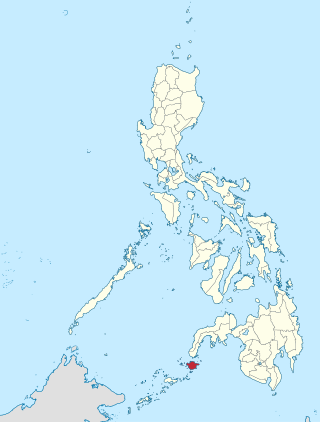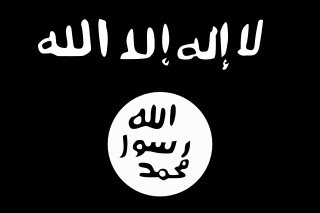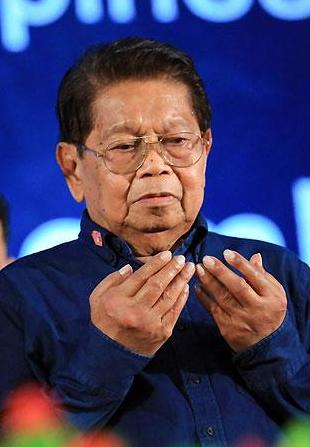Related Research Articles

The Moro Islamic Liberation Front is an Islamist group based in Mindanao, Philippines, which sought an autonomous region of the Moro people from the central government. The group has a presence in the Bangsamoro region of Mindanao, the Sulu Archipelago, Palawan, Basilan, and other neighbouring islands. The armed wing of the group was the Bangsamoro Islamic Armed Forces (BIAF), although the name of its parent organization, the MILF, was often used to refer to the BIAF.

The Autonomous Region in Muslim Mindanao was an autonomous region of the Philippines, located in the Mindanao island group of the Philippines, that consisted of five predominantly Muslim provinces: Basilan, Lanao del Sur, Maguindanao, Sulu, and Tawi-Tawi. It was the only region that had its own government. The region's de facto seat of government was Cotabato City, although this self-governing city was outside its jurisdiction.

The Moro National Liberation Front is a political organization in the Philippines that was founded in 1972. It started as a splinter group of the Muslim Independence Movement. The MNLF was the organization most active in the Moro conflict for about two decades beginning from the 1970s.
2000 in the Philippines details events of note that happened in the Philippines in the year 2000.

The Moro conflict was an insurgency in the Mindanao region of the Philippines which involved multiple armed groups. A decades-long peace process has resulted in peace deals between the Philippine government and two major armed groups, the Moro National Liberation Front (MNLF) and the Moro Islamic Liberation Front (MILF), but other smaller armed groups continue to exist. In 2017, the peace council settled around 138 clan conflicts.

The 2007 Basilan beheading incident was an armed incident that took place in July 2007 between the Moro Islamic Liberation Front (MILF) rebels and the Philippine Army. The incident led to the execution of 14 or 23 members of the Philippine Marines; amongst them 11 were beheaded in the province of Basilan, which is located within the southern Philippines.
The 2008 Battle of North Cotabato was a military confrontation between the Armed Forces of the Philippines and a rogue Moro Islamic Liberation Front (MILF) faction under the command of Umbra Kato in North Cotabato, a province of Mindanao, in the Philippines.
Consortium of Bangsamoro Civil Society, abbreviated as CBCS, is the largest umbrella civil society organization (CSO) composed of 168 Moro non-governmental organizations (NGOs) and peoples organizations (POs) in Mindanao, Philippines.

The Mindanao bombings was a series of seemingly unrelated bomb attacks that took place on July 4, 5, and 7, 2009 in the towns of Datu Piang and Jolo, and the cities of Cotabato and Iligan in Mindanao, Philippines. The bombings killed around 7 people and injured at least 66. The Armed Forces of the Philippines has blamed several militant organizations active in Mindanao, such as the Moro Islamic Liberation Front (MILF), the Abu Sayyaf, and Jemaah Islamiyah.
Maradeka is a pro-democracy Islamic political organization which espouses non-violent political action, and is based in the Philippines. The organization has been active against a backdrop of over 40 years of armed Muslim insurgency, mounted by the Moro National Liberation Front (MNLF) and Moro Islamic Liberation Front (MILF) in their quest for self-rule. These groups emerged following popular dissent with the Philippine government, and their treatment of the Muslim minority as second class citizens, which caused extensive suffering. These years of social, economic, and political inequities are known as the 'Mindanao problem'.

The Bangsamoro Islamic Freedom Fighters (BIFF), also known as the Bangsamoro Islamic Freedom Movement, is an Islamist jihadist militant organization based in Mindanao, in the southern Philippines. It is a smaller player in the overall Moro insurgency and is mostly active in Maguindanao and other places in central Mindanao. It is a breakaway group from the Moro Islamic Liberation Front founded by Ameril Umbra Kato. Following Kato's death, the group split into three factions, one of which has aligned with the Islamic State, while the other two are less radical.

The Zamboanga City crisis or Zamboanga Siege was an armed conflict in Zamboanga City, Philippines between the government forces of the Philippines and Moro rebels from the Moro National Liberation Front (MNLF) that began on September 9, 2013 and ended twenty days later on September 28. The conflict began when MNLF rebels, under the command of Nur Misuari, attempted to occupy several coastal communities in Zamboanga City in protest of the Philippine government's failure to implement the 1996 final peace agreement with the MNLF.

The Mamasapano clash was a shootout that took place during a police operation by the Special Action Force (SAF) of the Philippine National Police (PNP) on January 25, 2015, in Tukanalipao, Mamasapano, then-undivided Maguindanao. The operation, codenamed Oplan Exodus, was intended to capture or kill wanted Malaysian terrorist and bomb-maker Zulkifli Abdhir and other Malaysian terrorists or high-ranking members of the Moro Islamic Liberation Front (MILF).

Ahmad Akmad Batabol Usman, more commonly known as Abdul Basit Usman, was a Filipino terrorist and a bomb-making expert who led the Special Operations Group of the Bangsamoro Islamic Freedom Fighters and had links to the Abu Sayyaf and Jemaah Islamiyah militant groups. Usman was on the United States' Rewards for Justice Program list, which offered $1 million for his capture.

The 1976 Tripoli Agreement was signed on December 23, 1976, in Tripoli, Libya by Carmelo Z. Barbero, representing the Government of the Philippines and Nur Misuari of the Moro National Liberation Front. The agreement defined autonomous administrative divisions for Muslims in the southern Philippines, the establishment of an autonomous government, judicial system for Sharia law and special security forces, and the observance of a ceasefire. The autonomous region was to have its own economic system, including an Islamic bank.

Dawlah Islamiya, also called Islamic State of Lanao and formerly named as the Maute Group, is a radical Islamist group composed of former Moro Islamic Liberation Front guerrillas and foreign fighters. Based in Lanao del Sur, it was founded by brothers Abdullah and Omar Maute. The organization, which also conducted a protection racket operation in the municipality of Butig, clashes on several occasions with the Armed Forces of the Philippines, the most significant of which began in May 2017 and culminated in the siege of Marawi.
This is a chronology of the Moro conflict, an ongoing armed conflict in the southern Philippines between jihadist groups such as the Abu Sayyaf Group, the Maute Group, Jemaah Islamiyah, and Islamic State affiliates, mainstream separatist groups such as the Moro Islamic Liberation Front (MILF), the Moro National Liberation Front (MNLF) and the Bangsamoro Islamic Freedom Fighters (BIFF), and the Philippine Government since 1971. Much of the fighting has been concentrated on the island of Mindanao and the Sulu archipelago, with spillover incidents and attacks occurring in the Philippine capital Manila and neighboring countries such as Malaysia.
The 2000 Ozamiz Ferry Bombing is one of the Philippines' bloodiest bombing incidents. At least 44 people were killed, while more than 100 ferry passengers were wounded.
On July 31, 2018, a bomb exploded in the town of Lamitan in Basilan, Philippines.

Hajji Salik B. Abu more commonly known as Ghazali Jaafar was a Filipino militant and government official. He fought under the Moro Islamic Liberation Front (MILF). He served as chairman of the Bangsamoro Transition Commission (BTC), and the Speaker of the Parliament designate under the Bangsamoro Transition Authority (BTA), the interim regional government of the Bangsamoro Autonomous Region in Muslim Mindanao.